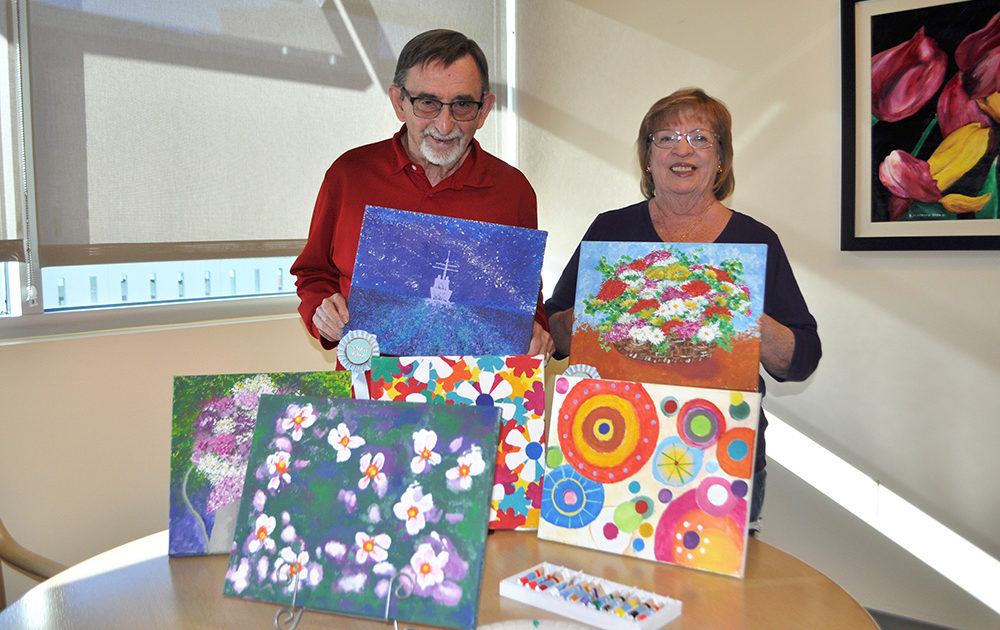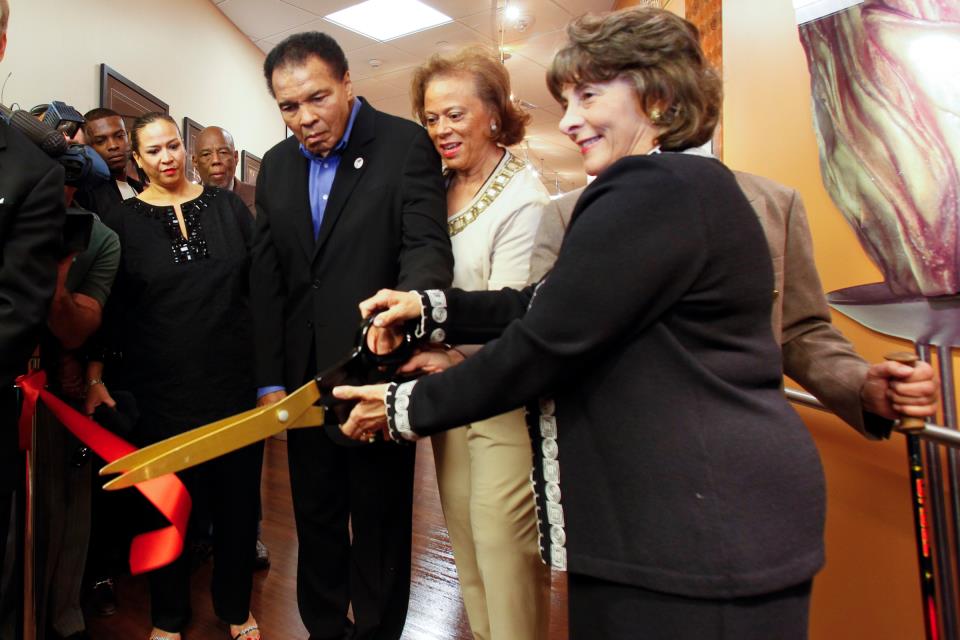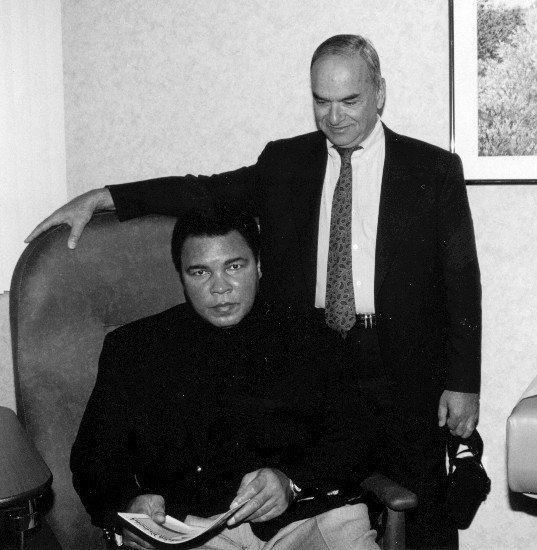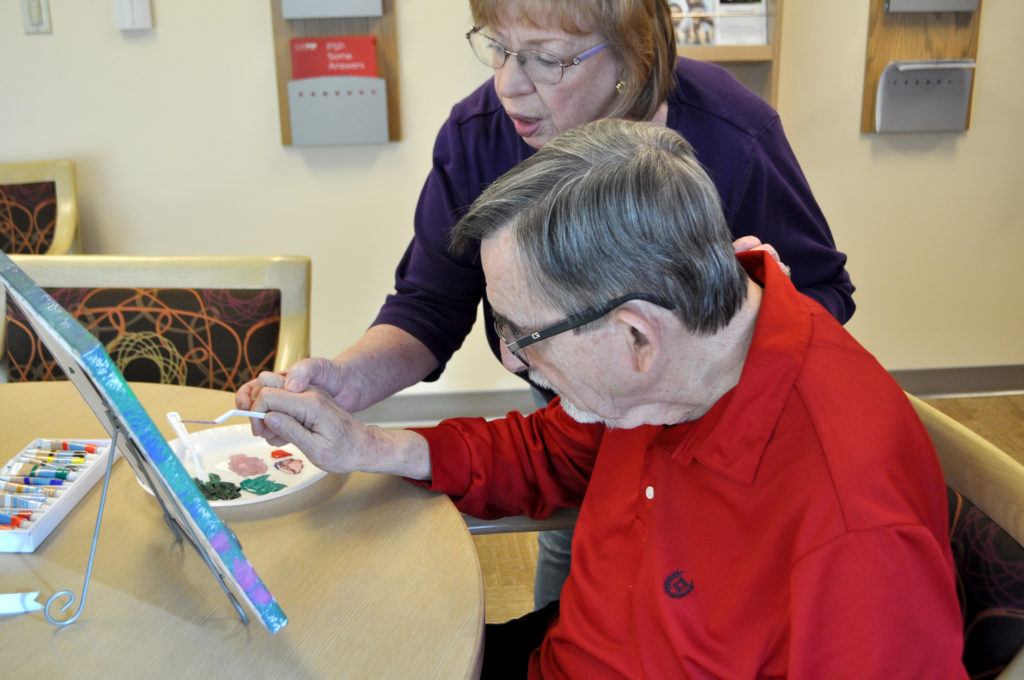
Patient, Wife Reflect on 25+ Years with Muhammad Ali Parkinson Center
Update: It is with sadness that we share that John O’Donnell passed away in July 2022 after a courageous, 29-year battle with Parkinson’s disease. While the Barrow family mourns his passing, we hope this story can provide hope and inspiration for families affected by a Parkinson’s diagnosis and serve as a testament to the life he lived.
The first time John O’Donnell met Muhammad Ali, he didn’t ask for the world heavyweight champion’s autograph. Instead, he slipped Muhammad a chocolate chip cookie from the refreshment table across the room.
“Anybody that knows anybody with Parkinson’s disease knows that they’ve got a sweet tooth,” said John’s wife, Karen. “We decided we would never ask Muhammad for his autograph, because we knew how difficult it was for John to write anything. We didn’t want to put him through that.”
Several years later, at another event for the Muhammad Ali Parkinson Center at Barrow Neurological Institute, the O’Donnells met Muhammad a second time.
“Even though Muhammad didn’t speak, he recognized John because John had given him a cookie some years before,” Karen said. “There was little John—with great, big Muhammad Ali leaning on his shoulder.”
A Small Space with a Big Future
John has been a patient at Barrow since 1993—four years before the formal establishment of the Muhammad Ali Parkinson Center.
John received his Parkinson’s diagnosis at age 51, but his symptoms may have actually started in his early 40s.
“We’ve been together close to 40 years, and it’s very possible that I never, ever knew John without Parkinson’s,” Karen said. “He had lost his sense of smell when I met him. It’s an early symptom, but we didn’t know that at the time. Then, he got some stiffness in his shoulder.”
John, who is now 80 years old, chalked that stiffness up to aging and vowed to exercise more frequently.
“His symptoms improved,” Karen recalled. “He was able to stave off a diagnosis of Parkinson’s disease for about 10 years.”
The neurologist who diagnosed John didn’t have much experience managing patients with young-onset Parkinson’s. He recommended John see Abraham Lieberman, MD, a neurologist at Barrow who was treating Muhammad Ali.
When the O’Donnells arrived for John’s first appointment at Barrow, they weren’t met with the 26,450-square-foot facility that houses the Muhammad Ali Parkinson Center today.
“It was literally one room,” Karen said. “The doctors’ offices were down a floor.”
But even with its modest space, the unnamed center impressed the O’Donnells with its small but dedicated staff.
When Dr. Lieberman confirmed John’s diagnosis, Karen realized they were in for a “long, hard haul.” She joined a support group co-sponsored by Barrow and Duet for Parkinson’s patients and care partners.
Soon after, Karen learned that Barrow also sponsored a support group specifically for young-onset Parkinson’s. She nudged John to attend a meeting with her.
Initially, John wasn’t eager to join the group. But after that first meeting, the engineer rearranged his business trips so that he could participate every month.
Involvement Through the Years
As the Center grew, so did the O’Donnells’ involvement in its programs. Barrow officially established the Muhammad Ali Parkinson Center in 1997. It expanded in 2009, becoming the most comprehensive Parkinson’s facility in the country.
Karen took over as co-facilitator of the support group she had joined, a role she held for nine years. On days when patients and care partners met separately, Karen mostly worked with the former while a social worker from Duet worked with the latter.
Karen also became certified in Art of Moving, an exercise program designed to address movement-related symptoms of Parkinson’s. She taught classes around the West Valley as a subcontractor for the Center.
“Karen found the time and dedication while managing her roles as mother, wife, caregiver, and professional,” said Kristina Watts, who has served as the Center’s patient services coordinator for 24 years. Kristina has been working with Parkinson’s patients and physicians at Barrow since before the Center’s dedication.

For five years, Karen and John also helped organize a golf tournament to raise funds for the Center. John was an avid golfer himself, who began caddying at age 10.
“His love of golf kept him playing for more than 20 years past diagnosis,” Karen said. “He had always wanted to have a hole-in-one but never had. Then after diagnosis, he had four.”
The couple also took part in tai chi, dance, and art classes. When the benefits of dance for people with Parkinson’s began to make national headlines, NBC Nightly News interviewed the O’Donnells about their participation in the Center’s dance classes. The segment featured John and Karen dancing in the kitchen of their Sun City home, as they often did, to “Blueberry Hill” by Fats Domino.
“John has always been very willing to do any kind of public relations for the Muhammad Ali Center,” Karen said.
John also found it important to participate in research. At Barrow, he volunteered in studies of the Parkinson’s drug pramipexole and a medication for Parkinson’s dementia.
He also joined a study at Arizona State University, which looked at handwriting and reflexes. As the only left-handed participant, John’s results sparked a new study.
“We’ve been involved pretty much at every level,” Karen said.
Reflecting and Refocusing
Both the medical and outreach staff expressed gratitude for the O’Donnells’ commitment to supporting the Center and others with Parkinson’s disease.
“I have known the O’Donnells for 20 years,” said Holly Shill, MD, John’s current neurologist and the director of the Center. “It has been amazing to work with them, watching in admiration as they tackle together whatever Parkinson’s has to offer them. They are an inspiration on how to live the best life possible with the disease.”
Kristina shared similar sentiments—describing John and Karen as compassionate, determined, and enthusiastic.
“Throughout the 25 years that I have known them, they are always available to talk to others struggling to cope with the diagnosis and help raise awareness whenever the opportunity arises,” she said. “I have enjoyed knowing them both and have been inspired by their commitment to each other, the PD community, and anyone in need.”
The feeling is mutual for the O’Donnells. They said the Center has helped them transition through every phase of John’s disease progression.
Today, they are part of the Lonnie and Muhammad Ali Legacy Care Program. Established in 2017 with a generous grant from The Bob & Renee Parsons Foundation, the Program extends care into the home of patients who face challenges traveling to the Center.
“The staff at the Center is amazing,” Karen said. “One of the things that I love about them is they’re constantly innovating and looking at new programs.”
The O’Donnells recently stepped away from the outreach programs to focus on John’s increased care needs. Still, their longstanding involvement with the Center is celebrated by the staff and reflected in the plaques hanging on a wall in their home.
On the opposing wall hangs a poster—without an autograph—of Muhammad Ali.


